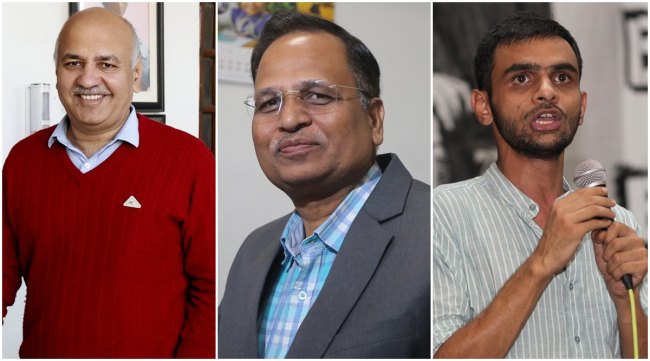Opinion From Manish Sisodia and Satyendar Jain to Umar Khalid – guilty until proven innocent
Conviction rates in UAPA, PMLA cases have been low, but with repeated denial of bail, the process of justice is the punishment for undertrials
 Former Delhi Deputy CM Manish Sisodia is still in custody and Satyendar Jain was granted bail recently on medical grounds. Umar Khalid, who is charged under UAPA, has been denied bail repeatedly. (Express photos)
Former Delhi Deputy CM Manish Sisodia is still in custody and Satyendar Jain was granted bail recently on medical grounds. Umar Khalid, who is charged under UAPA, has been denied bail repeatedly. (Express photos)
There are various ways to describe the tumultuous times we live in. Gen Z, for example, would describe the current moment as one of “peak politics” — a heightened state where political considerations determine even the process of justice.
The Enforcement Directorate (ED), tax authorities and CBI seem to have been unleashed on opposing politicians, common citizens, and journalists (even foreign media houses). The courts weigh in, but the process is long and arduous. And we wait.
The Supreme Court has time and again reiterated the principle that “bail is the rule, jail is the exception”. Till recently, this principle was observed, especially in the case of economic offences. That has now changed, with undertrials often being denied bail. The common refrain of investigating agencies when arguing for custody is that the investigation is at a “crucial stage”.
The gold standard for deciding on bail applications in economic offences was laid down in the landmark case of Sanjay Chandra vs CBI. The Supreme Court held that the following conditions have to be considered: Seriousness of the charge; severity of the punishment; the likelihood of the accused fleeing from justice; and the likelihood of the accused tampering with witnesses. It held that if the investigation is complete and the chargesheet is filed, there is no requirement of keeping the accused in custody, and finally, that the gravity of the offences cannot be the sole basis for denying bail.
The SC had taken note of the fact you cannot do away with the principle “presumed innocent until proven guilty” and that the courts ought to tread the tightrope between trying to protect the personal liberty of the accused against securing their attendance at trial.
In the recent Delhi liquor policy scam cases, there have been three chargesheets filed by the ED and another chargesheet filed by the CBI. Satyendar Jain was granted bail recently only on medical grounds and former Delhi Deputy CM Manish Sisodia is still in custody. However, the investigating agencies, while vehemently objecting to bail applications, tend to take refuge under Section 173 (8) of CrPC, claiming that the investigation is still pending since new documents/witnesses have come to light and therefore, supplementary chargesheets will be filed at a later stage. They are, in a sense, implying that the investigation is ongoing and that, as a corollary, courts will be bound to deny bail.
The provisions of the Prevention of Money Laundering Act, 2002 are stricter by their very nature. For example, Section 24 of the PMLA places a reverse burden of proof on the accused to prove he is not guilty and until such burden is not discharged, the court will assume that the accused is guilty. However, this does not preclude courts from granting bail to an accused.
A report published in March 2023 shows that since the year 2005, although ED has registered around 5,906 cases, it has managed to close only 25 cases. That’s only 0.42 per cent of the total cases. It, therefore, begs the question: Will the likes of Satyendar Jain, Manish Sisodia and Saket Gokhale ever be convicted?
There are other draconian laws such as the UAPA (in which too, there is a reverse burden of proof) where, unsurprisingly, the conviction rate is abysmal. As per a 2022 report, for the period of 2015-20, a total of 8,371 persons have been arrested, out of which only 235 have been convicted. That is a staggering 97.2 per cent acquittal rate.
But we have Umar Khalid and other persons who are charged under UAPA being denied bail repeatedly. While Pinjra Tod activists Devangana Kalita and Natasha Narwal, charged under UAPA, were granted bail by the Delhi High Court in June 2021, it was only after they had spent more than a year in jail. In fact, while granting bail to these activists, the words of the Delhi High Court ring true even today: “We are constrained to express that it seems that in its anxiety to suppress dissent, in the mind of the State, the line between the constitutionally guaranteed right to protest and terrorist activity seems to be getting somewhat blurred. If this mindset gains traction, it would be a sad day for democracy.”
While we cannot today know whether the persons charged by the ED or CBI will be convicted at a later date, what is clear and becoming increasingly common these days is arresting citizens, irrespective of whether there is even a prima facie case against them. “Are we next?” is perhaps an albatross that hangs around many people’s necks.
The writer is a Delhi-based lawyer




